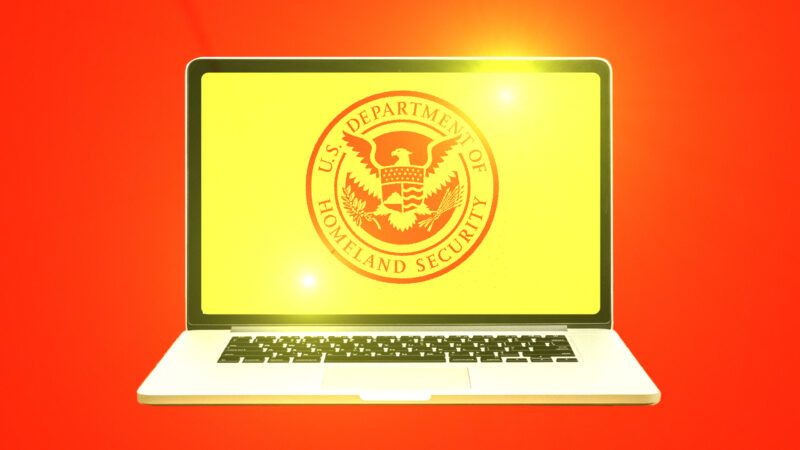Department of Homeland Security
DHS' Crusade Against Misinformation Is Another Example of Anti-Terror Mission Creep
While the Department of Homeland Security pressured tech companies to censor their users' posts, it also branded election deniers as potential terrorists.

On Monday, The Intercept published an article on the Department of Homeland Security's (DHS) efforts to combat misinformation and disinformation. Drawing on a combination of leaked and public documents, the outlet detailed how the DHS pressured major tech companies to police false election information on their respective platforms.
Twenty-four hours later, ProPublica published an investigation of its own, titled: "How the Biden Administration Caved to Republicans on Fighting Election Disinformation." It makes the case that as local election officials have begged federal agencies for help countering disinformation, "current and former [DHS] employees are frustrated that the agency's efforts have been hobbled in response to political pressure."
At first glance, these would seem to be contradictory reports. But taken together, the articles tell a consistent story of a federal agency with misplaced priorities.
The Intercept's article focused on DHS and FBI efforts to influence tech companies' moderation decisions. It cited internal documents and communications to show that starting before the 2020 election, the DHS and the FBI began holding regular meetings with representatives from each of the major tech companies, including Meta, Twitter, and Microsoft. The meetings, which have continued on a biweekly basis through at least August of this year, were intended to assess each firm's responsiveness to reports of misinformation and disinformation on its platform. Government agents also reported thousands of social media posts, many of which the platforms removed or flagged as a result.
The ProPublica article, on the other hand, concerns DHS initiatives to "counter the influence and impact of dangerous conspiracy theories that can provide a gateway to terrorist violence," specifically theories regarding U.S. elections. Election officials have asked the DHS for assistance regarding threats from conspiracists: Many supporters of former President Donald Trump, spun up by his long-debunked allegations of fraud, have spent the last two years harassing officials who administer local elections.
Earlier this year, the DHS' Cybersecurity and Infrastructure Security Agency (CISA) planned to roll out a new initiative from the Election Infrastructure Information Sharing & Analysis Center (EI-ISAC), which is within the Center for Internet Studies, a nonprofit partly funded by CISA. EI-ISAC is geared toward providing cyber defense for state and local election officials. According to ProPublica, the initiative would have "allowed elections officials to sign up for a service to protect them from having their identities and personal information exposed on the internet," as well as "created a system to track and alert elections officials who were subject to serious threats on social media, including from foreign actors."
The initiative stalled amid criticism from Republican lawmakers as well as bad press over the botched rollout of the DHS' Disinformation Governance Board. In response, election officials from Colorado and Florida sent a letter to DHS Secretary Alejandro Mayorkas and CISA Director Jen Easterly, asking them "to approve and fund" the program "to support us and help us protect ourselves." The ProPublica story cites several current and former DHS officials bemoaning the agency's "retreat" from disinformation enforcement.
Harassment of election officials is a very real issue. While most political rhetoric is protected free speech, the Supreme Court has recognized a "true threats" exception to the First Amendment. Since 2020, some people have been convicted for threatening election officials with violence or death.
But tasking the DHS, whose primary initial purview was directly related to the threat of terrorism, with adjudicating politically motivated threats against local officials has a high potential for abuse. In February, in a National Terrorism Advisory System Bulletin, the DHS referenced a "heightened threat environment" fueled in part by misinformation and disinformation "introduced and/or amplified by foreign and domestic threat actors." And in the letter to Mayorkas and Easterly, the Colorado and Florida officials contended that "doxing, threats, and intimidation faced by election personnel" fell under the definition of terrorism.
Fears of domestic terrorism often form the basis for calls to increase government surveillance and harassment of citizens. Last year, the National School Boards Association (NSBA) demanded a federal response to reports of threats and violent rhetoric against school board members by aggrieved parents, deeming it "a form of domestic terrorism." While not using the term domestic terrorism, Attorney General Merrick Garland did issue a memo in response, directing the FBI and U.S. Attorneys to coordinate with local officials in each of the nation's 14,000 school districts to "facilitate the discussion of strategies for addressing threats against school administrators, board members, teachers, and staff." All this, despite the fact that reports of actual violence and threats against school board members were significantly overblown.
Federal and state laws already exist against both voter intimidation and poll worker intimidation. If the DHS is declining to treat such threats as terroristic in nature and leaving enforcement to agencies better equipped, then so much the better.


Show Comments (58)